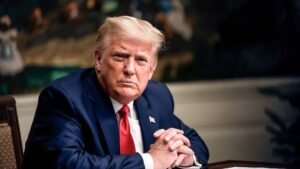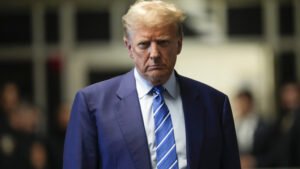
Alex Wong | Getty Images
A small group of influential billionaires, including Elon Musk and Timothy Mellon, have openly invested millions in former President Donald Trump’s bid for a return to the White House. According to a recent report from The Washington Post, however, some wealthy figures who previously criticized Trump are now treading carefully, fearful that a second Trump presidency could be marked by retribution against those who opposed him.
“With the White House appearing increasingly up for grabs, and especially as polls have tightened, numerous billionaires and other leading executives have taken steps in recent months to stay out of the race—even if they had criticized Trump after the Capitol insurrection of Jan. 6, 2021, calling his encouragement of the riot a threat to American democracy,” the report states.
Interestingly, some former Democratic donors are also keeping a low profile in the 2024 race, which critics and Trump allies alike have interpreted as a potential “peace offering” to the GOP’s presidential contender. This shift has drawn attention to how business magnates are preparing for the possibility of a Trump win, leading to cautious maneuvers that might help preserve their interests and reduce the likelihood of retribution under a second term.
One prominent example is Amazon founder Jeff Bezos, who has criticized Trump’s policies in the past. Bezos, who owns The Washington Post, has reportedly instructed the paper’s editorial team to refrain from endorsing Vice President Kamala Harris, a move that has triggered backlash from Post readers and led to a wave of cancellations.
Bezos has previously condemned Trump’s immigration policies, but his hesitation to endorse Harris has sparked speculation about whether he and others are seeking to avoid being targeted by a potentially vengeful Trump administration. Bezos is not alone in taking a cautious stance. Other wealthy figures are similarly concerned and cautious, and the Trump campaign has been vocal about the number of corporate leaders approaching them.
According to an unnamed Trump adviser cited in the report, “I’ve told CEOs to engage as fast as possible because the clock is ticking… If you’re somebody who has endorsed Harris, and we’ve never heard from you at any point until after the election, you’ve got an uphill battle.” In addition to courting influential backers, Trump has escalated his rhetoric against media organizations critical of him, targeting outlets like CBS News.
Recently, Trump threatened to revoke CBS’s broadcast license and hinted at legal action, reportedly due to their coverage of Harris. Trump’s aggressive approach toward the media underscores concerns among executives who fear they might be next in line for reprisal should they publicly support his opponents.
The billionaires’ reticence marks a stark shift from the post-January 6 period when many were vocal in condemning Trump’s actions. Now, with the stakes mounting and Trump’s criticisms of perceived adversaries increasing, some of the nation’s wealthiest figures are recalibrating their approach to avoid conflict with the former president and his administration-in-waiting. The situation has left many of Trump’s former critics silent, wary of stepping into a political battle that could cost them their business interests or put them in Trump’s crosshairs.


